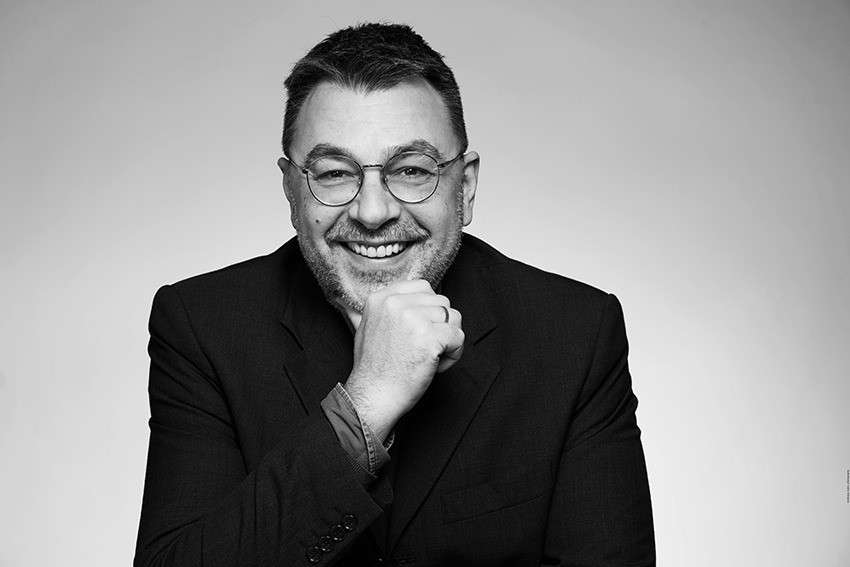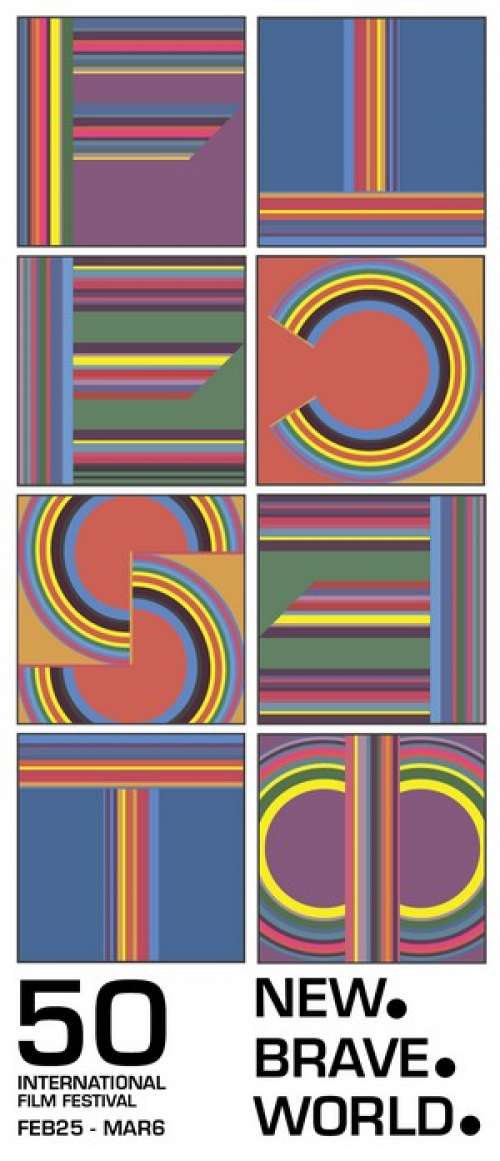On the last day of last year's FEST, when asked what you think the film offer for 2022 will look like due to pandemic circumstances, you answered: ‘As strange as it may seem, it is a bigger challenge for me and allows me to look for gems in those small cinemas until I might get to the point where the offer is common.’ Was it really challenging, as you predicted, to select films for the 50th FEST?
- Every year, the world film offer is so great that it is not easy to limit yourself to the number of films needed for the Festival. This year we are a little more restrictive in terms of the number of films - there are 88 premiere titles - primarily due to the absence of the Great Hall of the Sava Centre and the desire to make films available to anyone interested in seeing them.
I am satisfied with this choice, and I believe spectators will be as well. This year's programme is all that FEST should offer to the most demanding audience, as well as to the audience that wants to check whether the Oscar nominees and the winners of the most prestigious awards have been rightfully awarded, that is, nominated.
Selecting films for a festival like FEST is a pleasure, and a bit annoying, considering all the rules that globalism imposes in distribution policy. Although it is not easy today to save the film you really care about for the festival, we did our best and succeeded. I think that we have one outstandingly strong edition of FEST before us.
Didn't you feel an additional burden during the selection because this is a big jubilee, the 50th edition of the Festival?
- I think 50 years is a significant jubilee for a film festival, but I see it as just one in a series when we need to look back and remember those who created the Festival, enabled its survival and tried to make it a window to the world at the time it was held.
You proudly point out that FEST is one of the few festivals in the region that has been held in a physical, unchanged format since the beginning of the pandemic. How many challenges were there?
- The crisis, we know that, can be inspiring for those who create art; for those who make this art available, it is usually not, therefore this year, when we meet the pandemic for the third time at FEST (which I sincerely hope is in its downward trajectory, this time forever), we feel its limitations which, above all, refer to some ‘festival migrations’. It is encouraging, however, that just a few days before the start of this year's festival, we have a really impressive number of filmmakers coming to Belgrade.
Is it possible to find a common thread or a predominant theme that is present in this year's selection? Were the artists more turned towards themselves or more broadly, towards society, and to what extent, in general, has the current situation in the world influenced creativity in that sense?
- Yes, but I would not talk about people who are directly inspired by all these restrictions imposed by the global pandemic. I find many interesting stories that I think are the gradation of it all: screenwriters who have corrected their previously written stories and made them relevant in an extremely clever way when it comes to this issue.
I haven't noticed any dominant theme, but I have noticed something else - quite drastic examples of certain filmmakers insisting that they provoke a feeling of re-examination in the audience regarding the problem of the dualism of truth. That the truth is in the eye of the beholder sounds like a worn-out phrase, and in this way, I could most easily bring closer to the readers what I, as a viewer of certain films - which they are yet to see - could notice.
When you come out of the screening of the film ‘The Accusation’ ( Les choses humaines) by Yvan Attal (where outstanding roles are played by Charlotte Gainsbourg and Mathieu Kassovitz), you question yourself to the core, not only when it comes to your relationship with others but also the other way around. The point is that some truths that we have imposed on ourselves or that have simply been imposed on us need to be revised.
You used to say that you remember an edition of FEST first by the filmmaker you discover, instead by the screening of the Oscar-nominated film. Which filmmakers from this year's selection should we pay special attention to, either the debutants or the ones not yet established?
- The first thing that catches your eye, when you look at the Festival programme, are some FEST favorites. There are a lot of filmmakers that I have characterized in recent years as ‘newcomers’ that need attention. Some of them, meanwhile, have also received awards at FEST. This year we have the Greek director Argyris Papadimitropoulos in the jury, who won the Belgrade Victor for the 2017 screenplay for the splendid film ‘Suntan’.
Brazilian filmmaker of Algerian origin Karim Aïnouz is finally coming to FEST. Although this year his film ‘Mariner of the Mountains’ (O Marinheiro das Montanhas) is not in the Competition Programme, but in the FEST Focus selection, in 2020 Karim triumphed at the Festival with the film ‘Invisible Life’ (A Vida Invisível).
There is also the brilliant Kornél Mundruczó with the film ‘Evolution’ ... We have a large number of filmmakers who we simply nurture from year to year.
As for to our wider audience still insufficiently affirmed filmmakers, I would recommend, for example, the French director Quentin Dupieux, who competes in the Main Programme with the film ‘Incredible but True’ (Incroyable mais vrai). His work ‘Deerskin’ (Le daim) was shown at FEST in 2020 with great success. He is someone who deserves to be discovered by the wider audience of FEST, considering that he is certainly one of the filmmakers from whom, in the years to come, we expect even more.
Sonja Tarokić, who comes to us from neighboring Croatia, made an extremely interesting film, ‘The Staffroom’.
The work ‘Luzifer’ by the Austrian Peter Brunner deserves attention, one of the most pleasant surprises from the German cinema, with the brilliant Franz Rogowski, who established himself as the leading German actor of his generation with this film as well as with the film ‘Great Freedom’ from last year.
Dina Duma from Northern Macedonia directed one of the most pleasant surprises for me that comes to us from the region, the film ‘Sisterhood’ (Sestri). It is easy to notice the impressive talent of the director, but I would especially like to point out the cinematographer, Naum Doksevski, whom, after watching the film in Bitola, I asked to meet.
The Romanian film ‘Immaculate’ (Imaculat) by Monica Stan and George Chipper-Lillemar should also be marked as a ‘must see’. Brothers Damiano and Fabio D'Innocenzo, who were awarded at FEST for the best screenplay for the film ‘Bad Tales’ (Favolacce) last year, are returning to the Main Competition Programme this year with ‘America Latina’. I hope none of them will misunderstand me when I say this, and I wish the audience decides to see this film, if I conclude that all admirers of the early phase of Yorgos Lanthimos in ‘America Latina’ will find the path he, I hope for a short while, has replaced with a different one. Another ‘old acquaintance’, Aleksey German Jr., who competed with the film ‘Dovlatov’ in 2018, will present the film ‘House Arrest’ (Delo) this time. The Russian director, like most of the mentioned filmmakers so far, will address the audience in the Kombank Hall, where the Main Competition Programme of FEST will be shown.
Namely, almost all those who compete for the Belgrade Victor awards want to come to Belgrade. This is another positive impact of the competition programme.
Apart from the mentioned Argyris Papadimitropoulos, who else will decide on the Belgrade Victor?
- The main jury this year includes Miloš Biković, Tamara Dragičević and Toni Gojanović, and György Ráduly, director of the Hungarian Film Archive.
This year, there are seven domestic films within the programme, can you tell us a little bit about them?
- Eight, if we include the short film ‘Organisms’ by Nikola Polić. The film ’Strahinja Banović’ by Stefan Arsenijević opens FEST, which, after the triumph at the A category festival in Karlovy Vary, is out of competition.
The film by Goran Radovanović, the recent winner of the Belgrade Victor for Best Serbian film for ‘The Makavejev Case or Trial in a Movie Theater’ (2019), is also out of competition. The director will now present his new documentary ‘Waiting for Handke’.
The Competition Programme includes two titles: ‘Darkling’ by Dušan Milić and ‘Working Class Heroes’ by Miloš Pušić. I am glad that Pušić's film was included in the Berlinale, where it was shown with success. That's great news.
After ‘Autumn in My Street’ and ‘Withering’, in the film ‘Working Class Heroes’, Pušić, with the help of a marvelous cast, managed to present one of the big and even bigger upcoming problems we face, and not only here. However, Dušan Milić deals with a problem that is quite unique in the world in his exceptional film ‘Darkling’. In a Carpenter's way, he manages to conjure up a feeling of fear and horror in the viewer and shares it with the heroes of this story, set in an isolated house where Serbs in Kosovo live.
This is not a horror film, but a film that talks about horror, and Milić managed to reach the viewer and his emotions in the way he wanted, which only speaks of what kind of filmmaker he is. Why this film - which could be shown in the Main Programme of any A category festival in terms of quality - did not have such a fate, it is a question that certainly goes beyond the story of art, film and talent.
The film ‘Communist Paradise’ by Miloš Stojanović is interesting as well. In addition to the fact that this is a film adaptation of the work of our great Aleksandar Popović, it is a bold depiction of a historical moment that corresponds to the present, in a way that deserves to be revealed. Two minority Serbian co-productions, ‘Pack of Sheep’ by Dimitris Kanellopoulos and ‘The Windseeker’ by Mihai Sofronea, will be shown in the Main Competition, that is, in the FEST Focus programme, where Goran Nikolić's ‘Heroes’ with the exceptional Mladen Sovilj will also be screened. We will watch Sloboda Mićalović in two films at FEST: in the American-Serbian film ‘The Game’ by Ana Lazarević and in Kazakhstan's ‘Sunflower’ by Elya Gilman.
The audience of FEST will, traditionally, have the opportunity to be the first to see new episodes of a domestic popular series?
- That's right. FEST viewers will be able to enjoy the beginning of the second season of the great series ‘Klan’, created, directed and written by Boban Skerlić. It is certain that the second season will delight all those who enjoyed the first and attract new fans. It is not easy to stand out in such a fierce and high-quality competition, and ‘Klan’ succeeded in that.
How do you see the future of FEST in relation to streaming platforms?
- Over the years, I have learned to concretize things. If the situation is as it is today, then the fate is as follows: we will not have ‘The Power of Dog’ by Jane Campion and we will not have films that will be shown in cinemas on a global level before the FEST takes place. But that is still not a problem. I think that this concept of FEST - competition programme, revue programme, emphasis on the region - is a concept for the future. It was made because of the questions we ask louder and louder, and one of them is your question. I don't see anything controversial in that. Of course, I would like to have the film by Jane Campion, considering that it is perhaps the best film made last year, but that is why we have other films that reach that amplitude of quality. Having in mind the world film production, I don't think that the platforms can drastically affect the quality of the Festival programme. At least for now.
Do you think the future of film festivals is at stake?
- I think that the view that festivals are something that has no perspective is absolutely not true. I really believe that festivals are the last defense of a quality non-commercial film. Especially today and here, where we have a cinema repertoire (with some exceptions), which is ruled exclusively by high-budget commercial films of large studios, against which I have nothing, but of course I miss a wider selection of other films in cinemas. FEST showcases films nominated for an Oscar or those that have triumphed at prestigious film festivals and which are not screened in Serbian cinemas after FEST. FEST and other film festivals allow the audience to really enjoy the artwork in the right way. Watching a film in alternative ways and seeing it at a festival in cinemas is the same as watching Paja Jovanović in the National Museum or on a postcard or on the Internet, or watching a ‘Mona Lisa’ in a monograph or going to the Louvre. Cinema is the same as the Louvre or the National Museum, and the Internet is the other.
Could you recommend a good mood film for viewers who are tired of difficult and dark topics and want to feel positive excitement when they leave the hall?
- We often connect a part of the opus of some filmmakers with such films. I can't say that anyone who watches Almodóvar's ‘Parallel Mothers’ (Madres paralelas) will have that feeling. Having in mind individuality, it is difficult to generalize ...
When someone sees ‘Between Two Worlds’(Ouistreham), the brilliant film by Emmanuel Carrère with Juliette Binoche, he or she may have that feeling; I had a different feeling.
One of your colleagues is delighted with Leo Carax's film’Annett’, it awakens that feeling in her, it didn't awaken that feeling in me; my fascination with this film is from a completely different angle.
Earlier, I might have answered this question very simply, but now I am more suspicious and restrained. I accept those drastic differences that exist between us and I would not dare to tell anyone that something is a so-called feel-good film. In fact, one thing is for sure: ‘Official Competition’ will be presented by actor Oscar Martinez at FEST.









